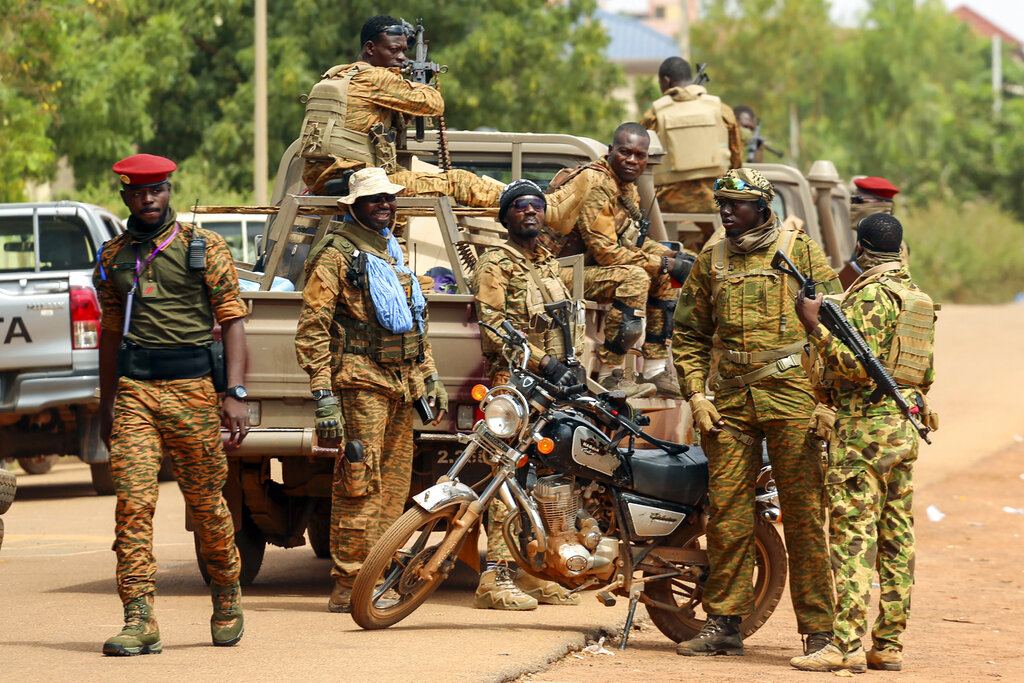Burkina Faso’s ruling military junta in mid-March announced it was recruiting 14,000 soldiers to fight rebels affiliated with al-Qaida and the Islamic State group (IS). The fighters are civilian defense volunteers known as VDPs.
The new soldiers will be involved in rapid response operations. They receive about 14 days of civic and military training before being armed and sent to the front lines of the nation’s counterinsurgency efforts.
“More than 14,000 soldiers of all types and thousands of (civilian defense force volunteers) have been recruited, trained, and equipped,” Prime Minister Rimtalba Jean Emmanuel Ouedraogo said in a report by The Defense Post.
The junta, led by Capt. Ibrahim Traoré, previously has conducted similar VDP recruitment efforts. In August, it launched the recruitment of 35,000 volunteer fighters.
“The mission of these communal VDPs is to protect, alongside the defense and security forces, the people and property of their communes of origin,” Col. Boukaré Zoungrana, commander of the Brigade of Vigilance and Patriotic Defense, said in a joint report by Rédaction Africanews and Agence France-Presse.
Between October and November 2022, shortly after Traoré gained power, 90,000 people signed up during a VDP recruitment drive, according to the Armed Conflict Location & Event Data (ACLED) project.
Traoré has used VDPs to conscript dissidents and activists to silence critics. After the August 2024 recruitment drive, Human Rights Watch (HRW) accused the junta of using security forces to punish judges and prosecutors by conscripting them to battle jihadist fighters. According to HRW, six magistrates reported to a military base in Ouagadougou, the national capital, and “have not been heard of since.”
According to a 2024 ACLED report, Traoré’s “aggressive mobilization and expansion of the VDP” has long-term implications for the country’s social fabric and intercommunal relations, “especially as aggressive military tactics have been met with increasing militant violence against the military forces, the VDP, and the civilian population.”
VDPs also have been accused of committing atrocities against civilians. Days before the announced recruitment in March, VDPs were accused of killing dozens of civilians in the western city of Solenzo. The victims, many of whom belonged to the Fulani ethnic group, reportedly were targeted in a possible reprisal attack amid ongoing counterinsurgency operations, according to HRW, which viewed social media videos of the two-day slaughter.
Videos of the Solenzo massacre reviewed by HRW are chilling. One shows a dead woman bleeding from the head on the ground beside a seriously injured toddler lying face up in the dirt.
“It’s the work of your parents that brought you here,” an attacker says. “You think you can get all of Burkina Faso. This is your end.”
In another, a badly injured young woman was shown on the ground next to a toddler. According to HRW, two male voices taunt her by asking why she can’t stand up, and they threaten to take the child.
“You, the Fulani people, do you think you can take over Burkina Faso?” someone asks her off-camera. “You will never! What is left for you to do here is to disappear. Where are those holding weapons?” The woman said she did not know. “How come you don’t know? We will finish you,” a man told her. The attackers left with the child.
The videos “underscore the pervasive lack of accountability of these forces,” Ilaria Allegrozzi, senior Sahel researcher at HRW, said on the organization’s website.
VDPs are supposed to train and arm civilians of all ethnicities to defend their communities alongside traditional security forces, but they have excluded Fulani due to paranoia about their potential ties to jihadists, analyst Michael DeAngelo wrote for the Foreign Policy Research Institute.
Armed Islamist groups in Burkina Faso have recruited the Fulani by exploiting their frustrations over government corruption and competition for natural resources.
Despite the activation of VDPs and other counterinsurgency efforts, insurgents hold as much as half of the nation’s territory. As of mid-March, armed groups had gained ground about 100 kilometers to the north and east of Ouagadougou, sources told The Defense Post.

